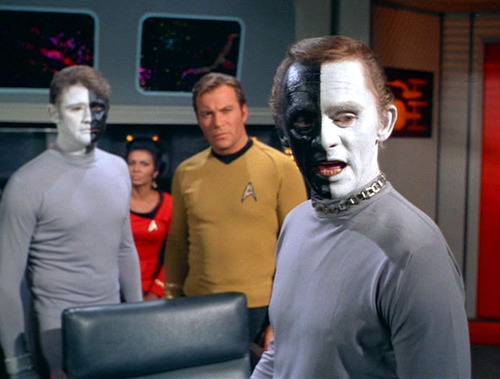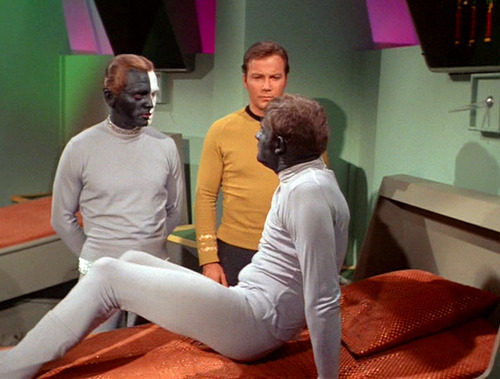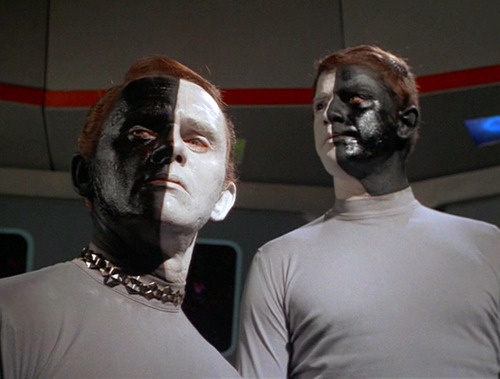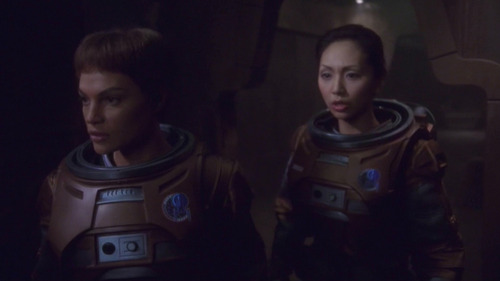Time to tackle one of the most iconic classic Trek episodes: “Let That Be Your Last Battlefield.”
In this barely-veiled allegory for racism in America, with additional references to the Vietnam War and nukes, two half-black/half-white aliens (but with the black and white on opposite sides of their bodies) fight each other out of age-old racial prejudice.
It’s a third season episode with effects that suffered from a tightened budget (consider Bele’s invisible ship) and issues with story and pacing. But there’s a reason people remember this episode and it’s the story concept. It was a story idea that only got made over network protests and no doubt sent a strong and even radical message for mainstream TV when it aired in 1969. But does the message hold up today?
The episode reinforces the Federation and Enterprise crew as part of a post-racial utopia. They can’t fathom Bele and Lokai’s prejudice:
Bele: It is obvious to the most simpleminded that Lokai is of an inferior breed.
Spock: The obvious visual evidence, Commissioner, is that he is of the same breed as yourself.
Bele: Are you blind, Commander Spock? Well, look at me. Look at me!
Kirk: You’re black on one side and white on the other.
Bele: I am black on the right side.
Kirk: I fail to see the significant difference.

This part of the allegory works – by pointing out that underneath the colour, Bele and Lokai are the same species, it nudges us towards recognizing that race is a social construct – the colour of one’s skin doesn’t determine their nature and cannot make someone inferior. It is rather something that creates artificial and destructive divisions.
But if we look at racism against black people in America, what we see is not just individual, mindless prejudice but systemic oppression built up over centuries and maintained because it privileges white people.
Likewise, in “Let That Be Your Last Battlefield,” there is indication that Bele’s people, who are black on the right side, hold the power on his and Lokai’s planet.

Lokai is considered a “political traitor” for leading a revolt of people who are black on the left side. The scene between Bele and Lokai in Sickbay is a well-written examination of how a ruling class uses racist rhetoric to justify its oppression of others.
First, Bele argues his people are benevolent paternal figures, only offering guidance to the “savage” or “inferior” race:
Bele: And you see how this killer repays you, as he repays all his benefactors.
Lokai: Benefactors? He’s a liar. He raided our homes, tore us from our families, herded us together like cattle and then sold us as slaves!
Bele: They were savages, Captain. We took them into our hearts, our homes. We educated them.
Lokai: Yes, just education enough to serve the master race.
Second, he argues Lokai’s people don’t deserve better treatment because of their bad behaviour:
Bele: You were the product of our love! And you repaid us with murder.
Lokai: Why should a slave show mercy to the enslaver?
Finally, Bele refuses to see the systemic discrimination that Lokai says still hurts his people and governs their lives:
Bele: Slaves? That was changed thousands of years ago. You were freed.
Lokai: Freed? Were we free to be men? Free to be husbands and fathers? Free to live our lives in equality and dignity?
Bele: Yes, you were free, if you knew how to use your freedom. You were free enough to slaughter and to burn all the things that had been built!
Lokai: I tried to break the chains of a hundred million people. My only crime is that I failed. To that I do plead guilty.
The comment on “free to be men…husbands and fathers?” is particularly poignant in light of the recent protests around Ferguson, Trayvon Martin and Black Lives Matter. Of course, black women also experience systemic racism in powerful ways. But the way the episode is written and focuses on two men, it never gets at the nuanced ways in which racism affects women differently (not to mention trans people, poor people and people with disabilities).

Unfortunately, it’s pretty much downhill from that first confrontation between Bele and Lokai in Sickbay. Through the rest of the episode the message gets simplified to be about nothing more than individual, irrational prejudice, rather than acknowledging the system that was in place in order to maintain one group’s oppression of the other.
When they arrive at the aliens’ planet, they find the two sides have “annihilated each other totally.” Bele and Lokai start blaming each other. Kirk tries to convince them to stop hating:
Kirk: Stop it! What’s the matter with you two? Didn’t you hear Spock? Your planet is dead! There’s nobody alive on Cheron because of hate. The cause you fought about no longer exists. Give yourselves time to breathe. Give up your hate. You’re welcome to live with us. Listen to me. You both must end up dead if you don’t stop hating.
But it’s too late for them to change. Bele chases Lokai around the ship until both transport back to Charon. The episode ends with Kirk again observing that “all that matters to them is their hate.”
Racism has always been about more than individual hate; it was and is about power. “Let That Be Your Last Battlefield” is an over-simplified and maybe even naive allegory for racism against black people in America. But it has its moments and is certainly notable for raising the issue of racial prejudice in the 1960s and reinforcing that humanity’s future should have no place for racism.
Bechdel-Wallace Test: Fail












1 Comment
Add Yours →This episode is most effective if one doesn’t notice that the antagonists have their colors on different sides of their bodies. I didn’t notice until the speech, “it is obvious even to the simple-minded…”, and had two lessons about racism indelibly implanted. 1) The difference between people is superficial, almost invisible. and 2) To the full-fledged racist, nothing is more important than his racism.